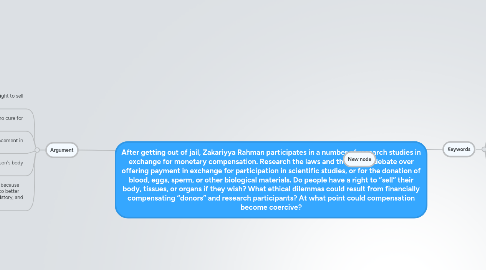After getting out of jail, Zakariyya Rahman participates in a number of research studies in exchange for monetary compensation. Research the laws and the ethical debate over offering payment in exchange for participation in scientific studies, or for the donation of blood, eggs, sperm, or other biological materials. Do people have a right to “sell” their body, tissues, or organs if they wish? What ethical dilemmas could result from financially compensating “donors” and research participants? At what point could compensation become coercive?
by Jasmine Wright

1. Argument
1.1. People should have the right to sell their biological material.
1.2. If they did not their would be no cure for diseases
1.3. There would be no advancement in technology
1.4. No new information about a person's body or life
1.5. People should be compensated because they are sacrificing their selves to better research, society, technology, history, and life itself.
2. New node
3. Keywords
3.1. Background information on Zakariyya Rahman
3.2. People's Rights
3.3. Ethical debates offering payment for participation in scientific studies
3.4. Laws on offering payment for participation in scientific studies
3.5. Laws on donation of biological materials
3.6. Ethical debates on donation of biological materials
3.7. Ethical dilemmas from financial compensation
3.8. Coercive compensation
3.9. HeLa cells' contributions


